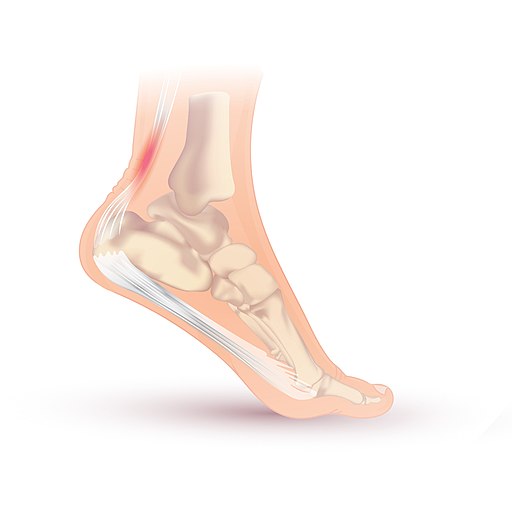Achilles Tendonitis: Causes, Treatments, and How West Coast Podiatry Center Can Help
Introduction
Achilles Tendonitis is a common condition that affects the Achilles tendon, a strong band of tissue connecting the calf muscles to the heel bone. It is characterized by inflammation, pain, and tenderness in the back of the leg, just above the heel. Whether you’re an athlete, a weekend warrior, or someone who leads an active lifestyle, understanding Achilles Tendonitis, its causes, and available treatments is crucial for managing and overcoming this condition. In this comprehensive blog post, we will delve into the details of Achilles Tendonitis, explore its causes, discuss various treatment options, and shed light on how the expert podiatrists at West Coast Podiatry Center can play a vital role in diagnosing, treating, and resolving this condition.
I. Understanding Achilles Tendonitis
The Achilles tendon is the largest and strongest tendon in the human body, enabling movements such as walking, running, and jumping. Achilles Tendonitis occurs when this tendon becomes inflamed, leading to pain and discomfort. It is commonly experienced by individuals who engage in activities that place repetitive stress on the tendon, such as running, dancing, or playing sports. However, it can also occur due to factors like aging, biomechanical imbalances, or underlying medical conditions.
II. Causes of Achilles Tendonitis
Several factors contribute to the development of Achilles Tendonitis:
- Overuse and Repetitive Stress: Engaging in activities that involve repetitive movements or sudden increases in physical activity can strain the Achilles tendon, leading to inflammation and micro-tears. This is often seen in athletes or individuals who participate in high-impact sports.
- Biomechanical Abnormalities: Certain foot and leg mechanics can put excessive stress on the Achilles tendon. Flat feet, high arches, pronation (inward rolling of the foot), or supination (outward rolling of the foot) can disrupt the normal distribution of forces during movement, increasing the risk of Achilles Tendonitis.
- Improper Footwear: Wearing shoes that lack proper support, cushioning, or stability can contribute to the development of Achilles Tendonitis. Inadequate footwear fails to absorb shock effectively, leading to increased stress on the tendon.
- Tight Calf Muscles: Inflexible calf muscles and limited ankle joint mobility can place additional strain on the Achilles tendon during physical activities, making it more prone to injury.
- Age and Degeneration: As we age, the blood supply to the Achilles tendon diminishes, leading to a reduced ability to repair and regenerate. This can make the tendon more susceptible to injury and slower to heal.
III. Who’s at Risk for Achilles Tendonitis
Several factors can increase the risk of developing Achilles Tendonitis. While the condition can affect anyone, certain individuals may be more susceptible. The following groups are at a higher risk for Achilles Tendonitis:
- Athletes and Active Individuals: People who engage in activities that involve repetitive movements or high-impact sports, such as running, basketball, tennis, or dancing, are at an increased risk. The constant strain on the Achilles tendon during these activities can lead to inflammation and injury.
- Weekend Warriors: Individuals who are typically sedentary during the week but engage in intense physical activity during weekends or sporadically are also at risk. Sudden increases in activity levels without proper conditioning or gradual progression can put excessive stress on the Achilles tendon.
- Middle-aged and Older Adults: Achilles Tendonitis tends to be more common in individuals between the ages of 30 and 50. As we age, the tendon may lose some of its elasticity and become less resilient, making it more susceptible to injury.
- Individuals with Biomechanical Issues: Certain foot and leg mechanics can place increased stress on the Achilles tendon. People with flat feet, high arches, or imbalances in their gait pattern (overpronation or supination) may experience abnormal forces on the tendon, making it more vulnerable to injury.
- Improper Footwear: Wearing shoes that lack proper support, cushioning, or stability can contribute to the development of Achilles Tendonitis. Inadequate footwear fails to absorb shock effectively, leading to increased stress on the tendon during activities.
- Sedentary Lifestyle: Prolonged periods of inactivity and lack of regular exercise can weaken the muscles and tendons, including the Achilles tendon. When these structures are not properly conditioned, sudden physical activity can put excessive strain on the tendon, increasing the risk of injury.
- Previous Tendon Injuries or Conditions: Individuals who have previously experienced Achilles Tendonitis or other tendon-related problems are at a higher risk of recurrence. Once the tendon has been weakened or damaged, it may be more susceptible to future injuries.
It’s important to note that while these factors increase the likelihood of developing Achilles Tendonitis, they do not guarantee its occurrence. Taking preventive measures, such as gradually increasing activity levels, wearing appropriate footwear, and maintaining good overall fitness, can help reduce the risk of Achilles Tendonitis and related injuries. If you have concerns or fall into any of the high-risk categories, it is advisable to consult with a healthcare professional or a podiatrist for personalized guidance and recommendations.
IV. Treatment Options for Achilles Tendonitis
The treatment approach for Achilles Tendonitis typically involves a combination of conservative measures aimed at reducing pain, promoting healing, and preventing further damage. Here are some commonly recommended treatment options:
- Rest and Modification of Activities: The first step in treating Achilles Tendonitis is to reduce or modify activities that aggravate the condition. This allows the tendon to heal and recover. Low-impact exercises like swimming or cycling can be alternatives that maintain cardiovascular fitness without placing excessive strain on the tendon.
- Physical Therapy: A structured physical therapy program can play a significant role in Achilles Tendonitis treatment. Physical therapists employ various techniques, including stretching exercises, eccentric strengthening exercises, ultrasound therapy, and massage, to promote healing, improve flexibility, and restore normal tendon function.
- Orthotic Devices and Footwear Modifications: Podiatrists may prescribe orthotic devices, such as shoe inserts or custom-made foot orthoses, to support the foot’s arch, correct any biomechanical abnormalities, and alleviate stress on the Achilles tendon. Proper footwear with adequate cushioning, arch support, and shock absorption is also essential in managing Achilles Tendonitis.
- Medications and Injections: Nonsteroidal anti-inflammatory drugs (NSAIDs), such as ibuprofen, may be recommended to reduce pain and inflammation. In some cases, corticosteroid injections may be administered directly into the affected area to provide short-term relief. However, these injections are typically used sparingly due to the potential risk of tendon weakness and rupture.
- Shockwave Therapy: Shockwave Therapy is a non-invasive procedure that utilizes high-energy shockwaves to stimulate healing and reduce pain. It has been found to be effective in treating chronic Achilles Tendonitis that has not responded to other conservative measures.
- Surgical Intervention: In severe cases of Achilles Tendonitis, where conservative treatments have not provided adequate relief, surgery may be considered. Surgical options may include tendon debridement, removal of scar tissue, or, in rare cases, a tendon transfer procedure.
V. How West Cost Podiatry Center Can Help
West Coast Podiatry Center is dedicated to providing comprehensive foot and ankle care, including the diagnosis, treatment, and management of Achilles Tendonitis. Here’s how our podiatrists can assist in your recovery:
- Accurate Diagnosis: The podiatrists at West Coast Podiatry Center will conduct a thorough evaluation at one of their locations in Sarasota, FL, Bradenton, FL, and coming soon, Venice, FL. The evaluation will include a detailed medical history review, physical examination, and potentially imaging tests like ultrasound to accurately diagnose the extent and underlying causes of your Achilles Tendonitis.
- Individualized Treatment Plans: Once a precise diagnosis is established, the podiatrists will create a customized treatment plan tailored to your specific needs. They consider factors such as the severity of the condition, your lifestyle, and your goals to determine the most appropriate treatment approach.
- Advanced Treatment Options: West Coast Podiatry Center stays at the forefront of advancements in podiatric medicine, ensuring access to the latest treatment options for Achilles Tendonitis. Their podiatrists are knowledgeable in innovative techniques such as shockwave therapy, which can facilitate healing and reduce pain.
- Rehabilitation and Physical Therapy: The podiatrists at West Coast Podiatry Center work closely with physical therapists to provide a comprehensive rehabilitation program. They will guide you through exercises and stretches that promote healing, strengthen the surrounding muscles, improve flexibility, and correct biomechanical imbalances.
- Patient Education and Support: West Coast Podiatry Center prioritizes patient education, ensuring that you have a thorough understanding of your condition, treatment options, and preventive measures. They provide ongoing support and guidance throughout your recovery journey, empowering you to take an active role in your healing process.
Conclusion
Achilles Tendonitis can be a challenging condition to manage, but with proper understanding, early intervention, and expert care, individuals can successfully overcome it. If you are experiencing symptoms of Achilles Tendonitis, do not hesitate to seek professional help. The knowledgeable podiatrists at West Coast Podiatry Center are dedicated to providing comprehensive care, utilizing the latest treatments and techniques to help you resolve your Achilles tendonitis and regain your active lifestyle.
Remember, early diagnosis and appropriate treatment are crucial for a successful recovery. Contact West Coast Podiatry Center today to schedule a consultation and take the first step towards healing and restoring your mobility.


